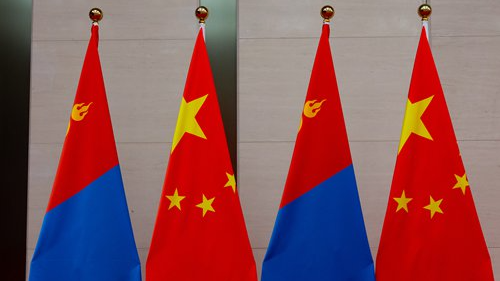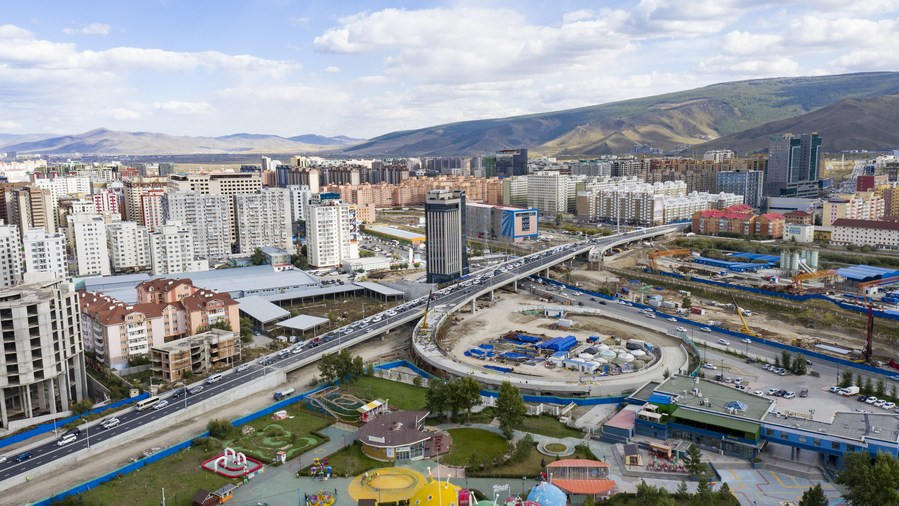
Editor's note: Ruqiya Anwar is a researcher, socio-political analyst, and PhD scholar of Media and Communication Studies from Pakistan. Her research is situated at the nexus between domestic and global politics and the intersection of politics and security.The article reflects the author's opinions and not necessarily the views of CGTN.
Mongolian President Ukhnaa Khurelsukh is on a state visit to China upon the invitation of Chinese President Xi Jinping on November 27-28. The visit is an opportunity for China to enhance strategic mutual trust and practical cooperation with Mongolia and set an example in neighborly relations to raise China-Mongolia relations to a new level.
It's Khurelsukh's first visit to China as Mongolian president, and continues on the goodwill and great tradition of close high-level exchanges between the two countries, as well as demonstrateing the wonderful expansion of the China-Mongolia comprehensive strategic cooperation.
As close neighbors, China and Mongolia share more than 4,700 kilometers of land border. This is evidenced by China's position as Mongolia's top investor and commercial partner for the past 18 years. Besides, 30 percent of Mongolia's foreign investment up to July 2017 came from China, which made up $4.1 billion in direct investments.
The leaders of the two nations will engage in a detailed exchange of ideas on bilateral ties, as well as global and regional topics of shared concern during the visit, and they will jointly map out the future of the development of China-Mongolia relations. According to Zhao Lijian, the Chinese foreign ministry spokesperson, "China looks forward to working with Mongolia to take this visit as an opportunity to deepen the strategic mutual trust and practical collaboration and set an example in neighborly relations to raise China-Mongolia ties to a new level.”

The China-funded overpass in Ulan Bator, Mongolia, September 16, 2019. /Xinhua
The China-funded overpass in Ulan Bator, Mongolia, September 16, 2019. /Xinhua
The development of a community with a shared destiny for China and Mongolia has advanced significantly and in-depth owing to the joint leadership of the two countries heads of state. China and Mongolia are friendly neighbors, partners, and brothers who can withstand any test. Mongolia has the longest land border with China with no disputes or unresolved issues and bilateral relations at the top level for building a comprehensive strategic partnership. Both nations are enjoying peace without a militarized standoff or cross-border terrorism.
Notably, maintaining, stabilizing, and expanding a healthy China-Mongolia relationship is in both nations' basic and long-term interests. The Mongolian gratitude the Chinese military for its anti-pandemic support and assistance and is willing to work with the Chinese side to strengthen pragmatic cooperation in personnel training, international peacekeeping, and military college medical services to advance the defense relationship between the two nations.
China's neighborhood policy with Mongolia has traditionally been one of cooperation, openness, mutual assistance, and consideration. As part of an effort to elevate the China-Mongolia comprehensive strategic relationship, China endeavors to strengthen trust, friendship, and collaboration between the two countries. To diversify bilateral ties, China intends to keep high-level talks with Mongolia and strengthen governance exchanges.
It is anticipated that in the future, there will be more room to increase cooperation in agriculture, animal husbandry, and energy since China and Mongolia have geographical support and the base and circumstances for long-term collaboration. Moreover, the Belt and Road Initiative (BRI) economic corridor intends to improve collaboration by improving trade volume, product competitiveness, transit facilitation, and infrastructure development through cooperative projects.
Mongolia's main exports are minerals and raw materials, making trade with other countries difficult. The BRI's transportation infrastructure appeals to Mongolia. China's BRI and its main Mongolian component, the China-Mongolia-Russia-Economic Corridor (CMREC), promise to boost trade between Mongolia and its neighbors and give Mongolia access to European Union overland routes and Asian seaports. Thus, Mongolia has participated actively in BRI construction from the start to expedite its economic growth by minimizing the drawbacks of having no sea access.
Therefore, taking this state visit as a potential, the two governments will expand cooperation in trade, financing, minerals and energy, connectivity, infrastructure, digital economy, and green development and push bilateral ties to a new high.
The frequent visits by leaders from other continents, with diverse political systems and development pathways, showed observers that China's progress benefits its people and provides development knowledge and collaboration prospects for other nations. Moreover, it shows that China can work with more countries regardless of their geography, political system, or development stage to establish a common future for humanity.
(If you want to contribute and have specific expertise, please contact us at opinions@cgtn.com. Follow @thouse_opinions on Twitter to discover the latest commentaries in the CGTN Opinion Section.)